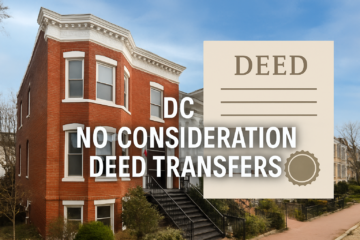Sure, you can prepare your quit claim deed and handle the deed transfer yourself, but there is a right way to do it and a wrong way. At Gentile Property Law Office, LLC, we do it the right.
1. Understanding the Basics of Deed Preparation
Before diving into specifics, it’s important to grasp what deed preparation involves. Deed preparation is not just about filling out paperwork; it signifies the legal transfer of property from one party to another. Understanding this process lays the foundation for more complex questions. Whether you’re dealing with a quitclaim deed or warranty deed, the significance remains the same in establishing ownership and rights over a property.
For starters, there is a fundamental difference between a deed and a title. While the two are often used interchangeably, they serve different purposes. A deed is a legal document proving property ownership, whereas a title represents the legal ownership rights.
2. Clarifying the Type of Deed
There are several types of deeds, each serving a different purpose. Warranty deeds, for example, assure the buyer of no prior claims against the property, providing the highest level of buyer protection. In contrast, quitclaim deeds offer less security, as they transfer only the interest the grantor possesses at the time of execution.
3. Evaluating Legal Descriptions
A precise legal description ensures there’s no ambiguity about the property boundaries and characteristics. These descriptions often involve metes and bounds, lot and block, or government survey methods, each with specific levels of detail and relevance.
A meticulous legal description can prevent costly and time-consuming boundary disputes down the road.
4. Ensuring Proper Signatures and Notarization
Gentile Property Law Office, LLC will make sure that the proper parties sign the deed. This can be done either in-person or using Remote Online Notarization. Gentile Property Law Office is registered in Maryland as a Remote Online Notary, so we conduct our own Remote Online Notarizations rather than sending you to another company.
5. Reviewing and Correcting Errors
Mistakes in legal documents can be costly. Before a deed is finalized, we perform a thorough review to catch inconsistencies or omissions.
6. Understanding Recording the Deed
Recording the deed is a critical step. Recording the deed with the appropriate government office makes the transaction public, safeguarding against fraudulent claims.
Gentile Property Law Office handles its own recordings and records all deeds electronically. Electronically recording deeds enhances security, and security is a priority at Gentile Property Law Office.
7. Assessing Potential Legal Implications
Finally, delve into any legal responsibilities or implications that come with your deed. Understanding these can safeguard against future complications. Specific deed types might carry particular expectations. At Gentile Property Law Office, we will review the implications of how you take title and make sure it aligns with your best interests and desires.
Reach out to joseph@gentileproplaw.com to discuss how we can help.




0 Comments